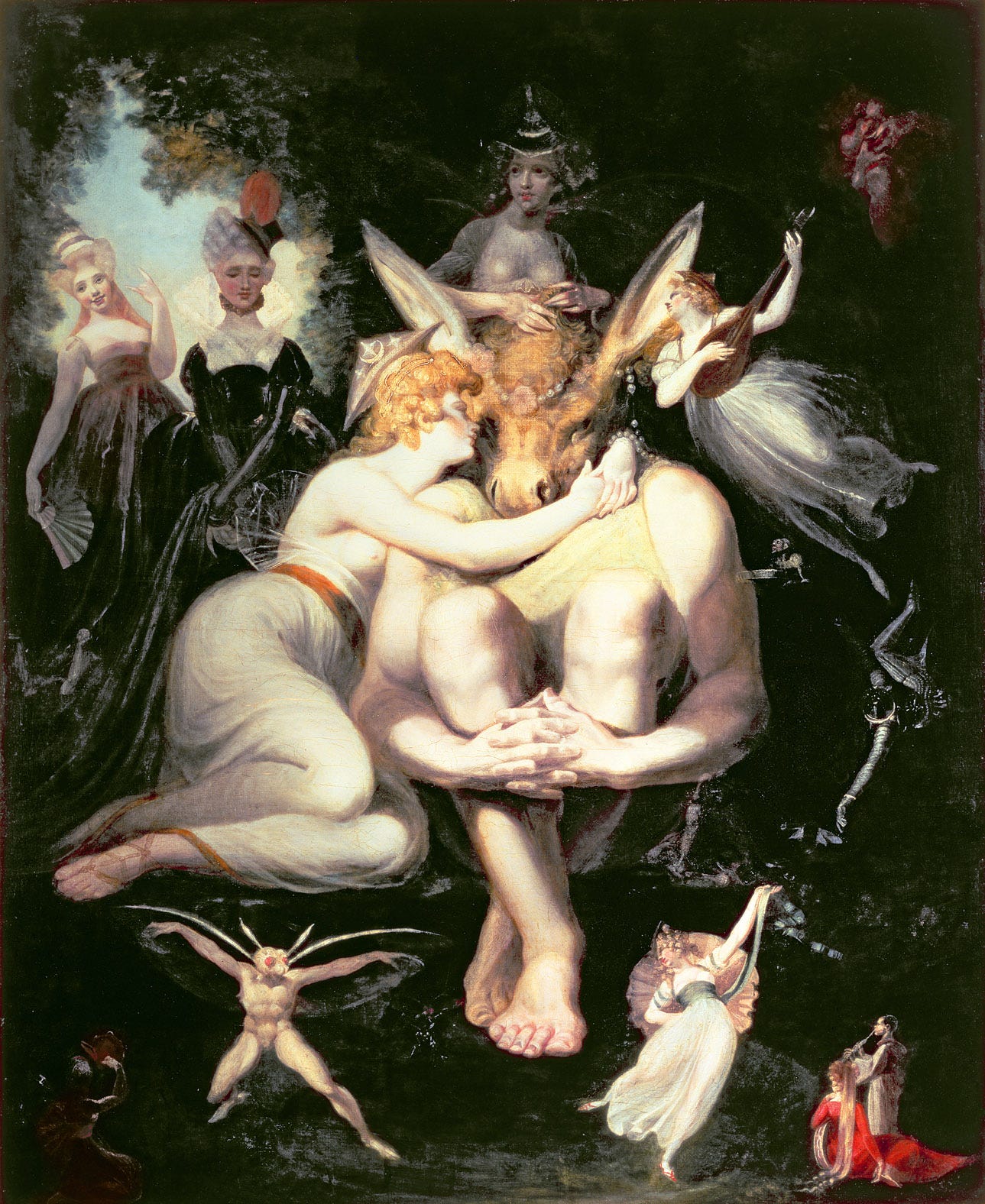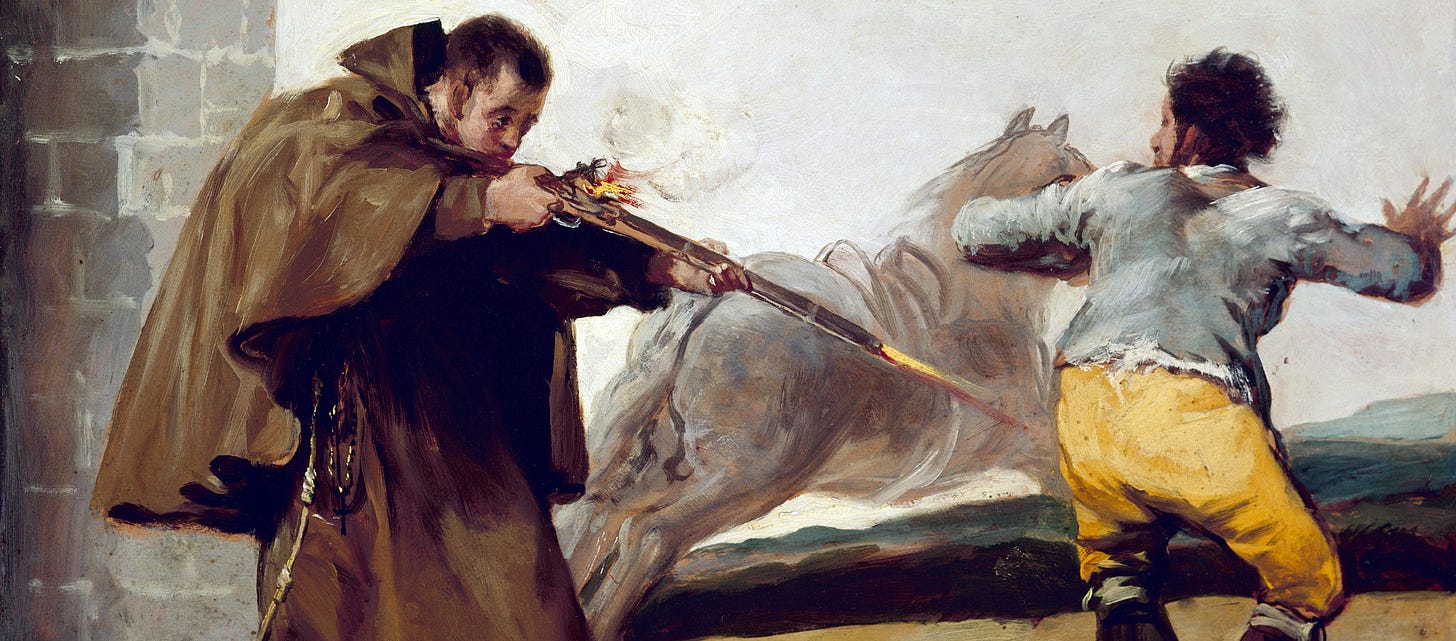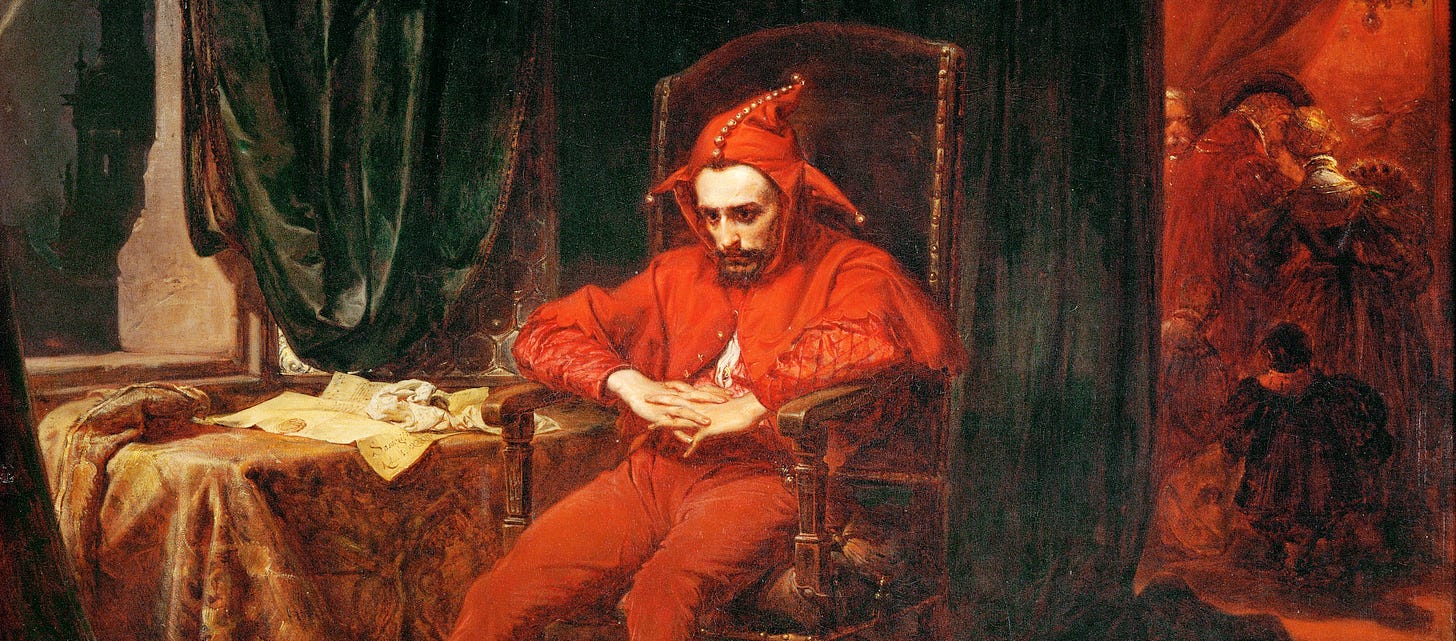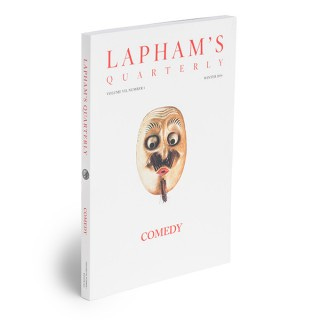Selected from the Winter 2014 issue of Lapham’s Quarterly.
Well, humor is the great thing, the saving thing, after all.
—Mark Twain, 1895
All jokes are inside jokes and the butts of them are us, the only animal that laughs, but also the only one that is laughed at. The weather isn't amusing, neither is the sea. Wombats don't do metaphor or standup.
—Lewis H. Lapham, 2014
A difference of taste in jokes is a great strain on the affections.
—George Eliot, 1876
But man, proud man, Dressed in a little brief authority, Most ignorant of what he's most assured, His glassy essence, like an angry ape, Plays such fantastic tricks before high heaven As make the angels weep; who, with our spleens, Would all themselves laugh mortal. —William Shakespeare, c. 1592
Humanity has advanced, when it has advanced, not because it has been sober, responsible, and cautious but because it has been playful, rebellious, and immature.
—Tom Robbins, 1980

The cause of laughter in every case is simply the sudden perception of the incongruity between a concept and the real object.
— Arthur Schopenhauer, 1818
There is a hell of a distance between wisecracking and wit. Wit has truth in it.
—Dorothy Parker, 1956
My way of joking is to tell the truth. It's the funniest joke in the world.
— George Bernard Shaw, 1904
Life is a tragedy when seen in close-up, but a comedy in long shot.
I used to think that everyone was just being funny. But now I don't know. I mean, how can you tell?
—Andy Warhol, 1970

The man who cannot laugh is not only fit for treasons, stratagems, and spoils, but his whole life is already a treason and a stratagem.
—Thomas Carlyle, 1833
There is nothing sillier than a silly laugh.
—Catullus, c. 60 BC
Laughter always arises from a gaiety of disposition, absolutely incompatible with contempt and indignation.
—Voltaire, 1736
Humor is not a mood but a way of looking at the world. So if it is correct to say that humor was stamped out in Nazi Germany, that does not mean that people were not in good spirits, or anything of that sort, but something much deeper and more important.
—Ludwig Wittgenstein, 1948
Anyone who takes himself too seriously always runs the risk of looking ridiculous; anyone who can consistently laugh at himself does not.
—Vaclav Havel, 1986
Pity and commiseration are mingled with some esteem for the thing we pity; the things we laugh at we consider worthless. I do not think there is as much unhappiness in us as vanity, nor as much malice as stupidity. We are not so full of evil as of inanity; we are not as wretched as we are worthless…Our own peculiar condition is that we are as fit to be laughed at as able to laugh.
—Michel de Montaigne, 1576
A jest breaks no bones.
—Samuel Johnson, 1781
A joke is at most a temporary rebellion against virtue, and its aim is not to degrade the human being but to remind him that he is already degraded.
—George Orwell, 1945
The two great branches of ridicule in writing are comedy and burlesque. The first ridicules persons by drawing them in their proper characters, the other by drawing them quite unlike themselves.
—Joseph Addison, 1711
Laughter is an affection arising from the sudden transformation of a strained expectation into nothing.
—Immanuel Kant, 1790
Through our culture's work of repression, primary possibilities of enjoyment, now spurned by the censorship within us, are lost. But all renunciation is very difficult for the human psyche, and so we find that tendentious jokes provide a means of reversing the process of renunciation and of regaining what was lost. When we laugh at an indecent joke that is subtle, we are laughing at the same thing that causes the bumpkin to laugh in a coarse obscenity; in both cases the pleasure is drawn from the same source, but we would not be capable of laughing at the coarse obscenity—we would be ashamed, or it would appear disgusting to us—we can only laugh when the joke has come to our help.
—Sigmund Freud, 1905

All comedies are ended by a marriage.
—Lord Byron, c. 1821
Some things are privileged from jest—namely, religion, matters of state, great persons, all men's present business of importance, and any case that deserves pity.
—Francis Bacon, 1597
The reason for the label sick comic is the lack of creativity among journalists and critics…The healthy comic would never offend...unless you happen to be fat, bald, skinny, deaf, or blind. The proxy vote from purgatory has not yet been counted.
—Lenny Bruce, 1963
I like to make people laugh every ten pages.
—Haruki Murakami, 2004

Sudden glory is the passion which maketh those grimaces called laughter, and is caused either by some sudden act of men's own that pleaseth them or by the apprehension of some deformed thing in another, by comparison whereof they suddenly applaud themselves.
—Thomas Hobbes, 1651
A laugh is too dearly bought when purchased at the expense of virtue.
—Quintillian, c. 93
Often from words and laughter proceeds railing and insult; and from railing and insult, blows and wounds; and from blows and wounds, slaughter and murder. If, then, you would take good counsel for yourself, avoid not merely foul words and foul deeds, or blows, wounds, and murders, but unseasonable laughter itself—and the very language of raillery—since these things have proved the root of subsequent evils. Therefore St. Paul said, "Let no foolish talking nor jesting proceed out of thy mouth."
—St. John Chrysostom, 387
Laughter is satanic; it is therefore profoundly human. In man it is the consequence of his idea of his own superiority; and in fact, since laughter is essentially human, it is essentially contradictory, that is to say, it is at one and the same time a sign of infinite greatness and of infinite wretchedness in relation to the beasts. It is from the constant clash of these two infinites that laughter flows. The comic, the power of laughter, is in the laugher, not at all in the object of laughter. It is not the man who falls down who laughs at his own fall, unless he is a philosopher, a man who has acquired, by force of habit, the power of getting outside himself quickly and watching, as a disinterested spectator, the phenomenon of his ego.
—Charles Baudelaire, 1855
It is well known that humor, more than anything else in the human makeup, can afford an aloofness and an ability to rise above any situation, even if only for a few seconds. The attempt to develop a sense of humor and to see things in a humorous light is some kind of a trick learned while mastering the art of living.
—Viktor Frankl, 1946
You can't go horseback riding with Jackie O in Central Park if you're going to make a joke about her that night.
—Joan Rivers, 2013
Lapham’s Quarterly is a project of the American Agora Foundation, which is dedicated to fostering an appreciation of, and acquaintance with, the uses and value of history. Please help us continue our work. Donate today.
COMEDY
Winter 2014




